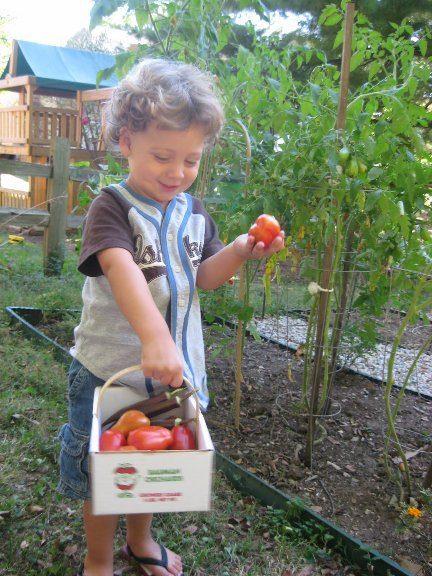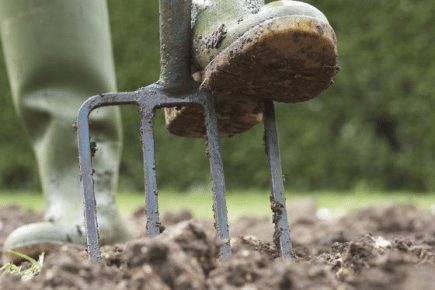While anyone who has a flower or vegetable garden feels the gardening health benefits found in planting and maintenance keenly every spring – it’s no longer just a grower’s assumption due to aching muscles. The King’s Fund charity in the United Kingdom released a study this May with serious recommendations to the medical community that it should be prescribed as an enjoyable way to promote better physical and mental health. The perennial collectors at large can stop saying acquiring new cultivars is an addiction, because that would imply that your gardening efforts are unhealthy, and the experts disagree with that conclusion. However, it would be wise to grow more fruits and vegetables while you’re at it, because nothing beats fresh-picked nutrient density – which makes your gardening benefits even healthier.
The study covered both a review of printed materials, and interviewing health experts to come the conclusion that gardens do have a positive impact on the health of the population from childhood through their senior years. Public gardens in urban areas are greatly influential to mental and physical health of those who spend time in the green space. An occasional brisk walk through the local park, or seasonal visits to botanical gardens is likely not what The King’s Fund is implying. It’s difficult to absorb the wonders of Nature at a trot. One must stop to smell the roses and study the cucumbers as they grow to be truly influenced by them. But greater benefits are found in actively gardening at home, or in a community garden plot, and perhaps not just for the exercise. Plants are more powerful than many assume. Soil is far more than dirt.

Kids benefit from gardening for life.
(Saving Family Green)
While not included in this Gardens and health: Implications for policy and practice report that was commissioned by the National Gardens Scheme, the physical connection to the soil is healing. We covered the findings from several US studies or journal papers in the mental and physical health industries that revealed that people who spend time being dirty regularly – farmers and home gardeners alike – have better immune systems, suffer from far less mental health issues, and are happier all around than those who live in large cities where bare ground is uncommon. The same is true of those who spend more time indoors than outside, and those don’t get out and work the soil. There are microbes in real soil that are beneficial to your physical and mental well being. Check out – Dirt: All Natural Mood Elevator.
One interesting thing pointed out… while the UK knows the current percentage of the population with gardens, and the amount of land space they occupy – the USDA finds only the agriculture industry sales volume that home gardens generate important enough to measure. Lawns in the US are accounted for regularly in statistics, and field crops – but not home or community gardens. The King’s Fund’s report shows that 44% of the UK population has a garden with the national landscape occupied by them is about the size of Wales. Meanwhile, the US is worried only about the number of flats, pots, a high dollar crops are produced under glass in the 15 top floriculture states, which includes annual vegetable plants. Mother Nature Network does know that the average US home vegetable garden is 600 square feet (median size: 96 sq. ft., that 38% of the population had a home garden, and as a whole the veggie patches produced $21 billion in home-grown food in 2008. Even here, the US statistics are all about dollars spent or investment returned – not about gardening health benefits.
Obviously, the UK finds that home gardening is far more important than officials in the US. The last time the USDA concerned themselves with what portion of the national land space was devoted to home gardens was in 1966. The statistics noted in the Agency for Toxic Substances and Disease Registry’s Public Health Assessment Guidance Manual references 44% of Americans having gardens that averaged 750 square feet and producing home-grown foods on an estimated 6 million acres of land – the same amount devoted for fruit and vegetable production in commercial agriculture. The most recent ATSDR Public Health Assessment does not mention anything about home-grown food that I could locate. A lot has changed in 60 years!
Gardening Health Benefits Should Be Global Knowledge
Spending time in the garden is not something that becomes a focus of leisure as you age. The King’s Fund study found that children who spent a lot of playtime in the garden at home take their knowledge of fruits and vegetables with them into adulthood. With most kids, and many adults, in the US not having any idea that food comes from plants, the 60-year separation from the soil in America is very telling. These same children are the adults and leaders of tomorrow. Ones more prone to depression, anxiety, mood swings, and other mental health problems thanks to insufficient time spent in green space, and no time spent growing plants in a garden for food or beauty.

Gardening health benefits include aerobic exercise. (Smiling Gardener)
Another key point reiterated in the UK report is that senior citizens who actively garden are less prone to depression and loneliness. But the same is true for anyone, as revealed in the US studies on spending regular time being covered in soil resulted in stable mental health and a notable reduction in mood swings. An earlier American university study done on the effect of flowers on the aging discovered that senior citizens who received a bouquet every week were more social than those who lacked the influence of cheerful blooms regularly.
Even if you live in an urban environment, securing a plot at a community garden will help to take advantage of it’s health benefits: a stronger cardiovascular system, improved resistance to illness and diseases, and one more way of reducing weight gain and obesity. If your community doesn’t have a garden that residents can get a plot or allotment in, or there aren’t enough gardening space to go around – then it’s high time someone changed that. Maybe that someone is you.
Something so beneficial to a person’s health and mental well-being shouldn’t be limited to those with money, or a college education, or be an activity put off until the kids are grown. The food you grow in excess of what your family can eat can be generate income. The education gained in raising crops is more valuable than one might assume. Kids involved in gardening from an early age are far more aware of what good food is and the secrets of the soil than their non-gardening peers.
[/et_pb_text][/et_pb_column][/et_pb_row][/et_pb_section]